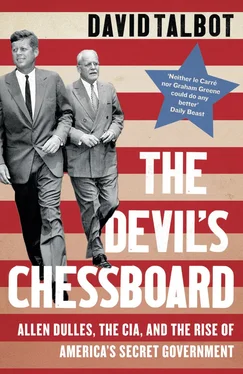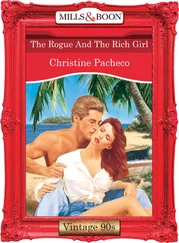short and pudgy,” observed Nixon. “His clothes were unpressed. His shirt collar was curled up over his jacket. He spoke in a rather bored monotone.” Hiss insisted that he had never met anyone named Whittaker Chambers—and he and the rumpled Chambers seemed to come from such different worlds that it was easy to believe him. But it was Chambers whom Nixon found convincing: he simply knew too many details about Hiss’s personal life. And there was something about this sad sack—a troubled but intelligent man who seemed to exude a strange mix of admiration, envy, and resentment toward Hiss—that strongly resonated with Nixon.
Nixon quickly emerged as Hiss’s most dangerous inquisitor, but Hiss held his ground under the young congressman’s relentless questioning, slyly taking aim at the most vulnerable part of his psyche. “ I am a graduate of Harvard Law School,” Hiss coolly informed the committee. He let that sink in, and then fixed Nixon with a level gaze. “And I believe yours is Whittier?” It was an expertly aimed harpoon, certain to deeply wound the man who was so obviously afflicted by what sociologists would later term “the hidden injuries of class.”
“ It absolutely ripped Nixon apart,” recalled Robert Stripling, HUAC’s chief investigator. “I realized from that moment on that he could not stand Hiss.”
Nixon knew that he was facing a formidable opponent. Hiss clearly had the Washington press on his side, as well as the White House. While the committee was interrogating him, President Truman told a press conference that the HUAC spy scare was nothing more than a “red herring” to divert Washington from more important business. Hiss’s testimony was full of references to leading political personalities with whom he was on a familiar basis. And they weren’t all Democrats. The biggest name he dropped—John Foster Dulles—produced a mighty echo in the cavernous caucus room of the Old House Office Building. Hiss reminded the committee that it was the Republican wise man who had offered him his current position as president of the prestigious Carnegie Endowment for International Peace, where Foster Dulles served as chairman of the board.
Nixon was well aware that Hiss, who accepted Foster Dulles’s offer and took over the Carnegie Endowment in January 1947, belonged to a Washington aristocracy that transcended party lines. By accusing Alger Hiss of being a traitor to his country, Nixon was not only threatening the career of a well-connected and widely respected public citizen, he was jeopardizing the reputations of Hiss’s prominent patrons—powerful men like the Dulles brothers, whom Nixon was counting on to advance his own career.
When he phoned Foster Dulles at his Wall Street office on the morning of August 11—the same office where he had been snubbed as a young law student—Nixon understood that it was another make-or-break moment for him. Foster agreed to meet that evening at Dewey’s hotel suite to discuss the Hiss-Chambers case. The Wall Street attorney appreciated the delicacy of the situation. As Dewey’s top foreign affairs adviser, Foster was poised to become the next secretary of state. The last thing he needed was a Washington tempest that tied him to a Soviet spy.
For Nixon, the anxiety hovering around the meeting was heightened by the fact that he harbored his own doubts about the case against Hiss. But men of action learn to conquer these disquieting voices inside, Nixon reminded himself. “ One of the most trying experiencesan individual can go through is the period of doubt, of soul-searching, to determine whether to fight the battle or fly from it,” Nixon wrote in Six Crises . “It is in such a period that almost unbearable tensions build up, tensions that can be relieved only by taking action, one way or the other. And significantly, it is this period of crisis conduct that separates the leaders from the followers.” A leader acted decisively. The failures are “those who are so overcome by doubts that they either crack under the strain or flee.”
Published in 1962, Six Crises was Nixon’s strangely belated answer to Profiles in Courage —the 1957, Pulitzer Prize–winning book by the charismatic man who had just beat him for president. Nixon intended his book to be a leadership manual, but it only highlighted his neuroses. Many observers thought Nixon’s desperate self-puffery bordered on hysteria. Writing in his journal after the book’s publication, Arthur Schlesinger Jr. called it “ an orgy in unconscious self-revelation.” President Kennedy told Schlesinger it showed that Nixon was a “sick” man.
But, as usual, Nixon’s opponents underestimated him. Nixon may have suffered from a tortured psyche, but it made him acutely sensitive to the nuances of power. He had a Machiavellian brilliance for reading the chessboard and calculating the next series of moves to his advantage.
When Nixon walked into Suite 1527 at the Roosevelt Hotel that summer night in 1948, he faced a formidable array of power. With Foster were his brother Allen, Christian Herter, and Wall Street banker C. Douglas Dillon, who would later serve President Eisenhower in the State Department and presidents Kennedy and Johnson as Treasury secretary. These men made up a significant section of the Republican Party’s ruling clique. If Nixon failed to convince them that he had a solid case against Hiss, HUAC would have to close its noisy show, and his political career would be wrecked just as it was gaining traction.
Foster felt that Nixon approached the group with the proper sense of humility, and no doubt trepidation. “ It was clear he did not want to proceed[with the Hiss investigation] until people like myself had agreed that he really had a case to justify going ahead,” Foster later remarked. Nixon knew that he was facing a skeptical audience. Herter, a mentor ever since their Marshall Plan junket, had already told Nixon he didn’t think he had a case. Herter had checked with his friends at the State Department, who assured him Hiss was not a Communist.
But Nixon was also aware that he came into the room with his own unique leverage. As the leading inquisitor in the Hiss case—an affair whose tendrils laced their way as far as John Foster Dulles himself—Nixon had the power to upend the Republican presidential campaign.
Nixon sat quietly in the suite while the Dulles brothers carefully read through the Hiss and Chambers transcripts. When they were done, Foster got to his feet and began pacing the room with his hands clasped behind him. The brothers realized that Nixon was right—and they had a problem. “There’s no question about it,” Foster frowned. “It’s almost impossible to believe, but Chambers knows Hiss.”
The Republican wise men took Nixon into their confidence, and once again the ambitious young politician came to a mutually convenient arrangement with the Dulles circle. It was another significant step for Nixon through the portals of power. With the Republican brain trust’s full support, Nixon would continue his aggressive pursuit of Hiss while keeping the spotlight carefully away from Foster and other GOP luminaries who were tied to the accused man. Meanwhile, Foster moved quickly to distance himself from Hiss, pressuring him behind the scenes to resign his Carnegie Endowment post, while Allen fed incriminating intelligence to Nixon to bolster his case. Some of this confidential information about Hiss likely came from the Venona project, the Army intelligence program that had been set up in 1943 to decrypt messages sent by Soviet spy agencies. The Venona project was so top secret that it was kept hidden from President Truman, but the deeply wired Dulles might have enjoyed access to it.
Nixon was impressed by the Dulles brothers’ bold decision to politically exploit the Hiss affair rather than run from it. The HUAC investigation could have been“ acutely embarrassing” to Foster, Nixon later noted. The Dulleses “could have suggested that I delay the proceedings until after the election.” But instead, with Nixon’s help, they turned the Hiss case to their advantage, with Dewey fulminating against the laxity of the Roosevelt and Truman administrations that had allowed Communists to penetrate the government. The meeting at the Roosevelt Hotel proved a turning point. For the next decade, Republicans would use Cold War hysteria not just to indict Communist Party members and sympathizers as traitors but to brand the entire New Deal legacy as un-American. Even former high-ranking New Dealers with impeccable credentials like Alger Hiss would be fair game in Washington’s new inquisitorial climate.
Читать дальше











